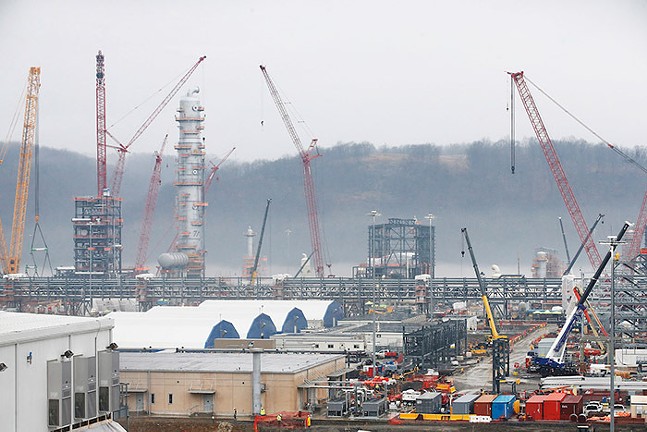
While the plastic production facility is permitted to generate 516 tons of Volatile Organic Compounds in a rolling year-long period, Pennsylvania’s Department of Environmental Protect found it released 663 tons in the 12 months ending in October.
“DEP is actively investigating these violations and obtaining additional information, data, and reporting from Shell and may take additional enforcement actions as appropriate to compel compliance, require corrective actions, and assess civil penalties,” the agency says in a press release.
The large petrochemical facility in Potter Township, Beaver County has been under construction for several years, and reported its first day of full operations on Nov. 15. Before its official start, the plant had been undergoing testing and was operating at a limited capacity, both of which contributed to the 663 tons of emissions.
The plant has the capacity to generate up to 3.5 billion pounds of polyethylene by heating and distilling liquid fuels.
While Shell has touted the giant complex as a needed injection of cash and jobs, local environmental advocates have consistently warned of its harmful potential.
Mark Dixon, a local filmmaker and environmental advocate, says this latest violation notice bears out their concerns.
“It is disturbing to watch this predictable tragedy unfold in such a beautiful area,” Dixon tells Pittsburgh City Paper. “The Shell plant is barely operational and they have already received DEP violations for fugitive emissions, malodor, and now, VOC emissions. If Shell wants support from the community, this is not the way to do it. Every violation is a betrayal of trust.”
The EPA designates more than 100 chemicals as Volatile Organic Compounds, most of which are generated through industrial processes. Many are harmful to human health and the environment, such as benzene and methane.
Shell’s permit indicates the Beaver County plant is “a major source of air contaminants for ozone precursors (nitrogen oxides (NOx) and VOCs), nitrogen dioxide (NO2), carbon monoxide (CO), particulate matter (PM10 and PM2.5), hazardous air pollutants (HAPs), and carbon dioxide equivalents (CO2e),” according to the DEP.
Clifford Lau, a chemical engineer who also serves as a local air quality advocate, says this mix of compounds will result in high levels of ozone emissions, a key factor in climate change, and a human health hazard.
“Ozone is a very bad respiratory irritant and can also cause cardiovascular disease,” Lau tells City Paper.
In a statement, Shell maintains its high emissions reflect fine-tuning procedures needed to bring the plant to full operation.
“Several factors contributed to the additional flaring during startup, all related to the complexities of commissioning brand new systems and equipment that make up one of the largest construction projects in the country,” Shell tells CP in a statement. “We will continue to transparently report out and comply with all regulations while also applying learnings and best practices to ensure our operations have no negative impact on people or the environment.”
Lau says, looking forward, the needle could potentially move either way.
"One could argue they are exceeding the amounts because they’re having trouble getting the plant started up,” Lau tells CP. “On the other side, the plant wasn’t fully operational. If you get all six crackers firing, you could see even more tons of emissions … and there’s no reason to believe they might not have a hiccup even when they’re fully operating.”The DEP has not yet imposed penalties in response to the violation and has requested a "root cause analysis" and a mitigation plan from the company within 45 days.

